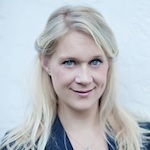Vocational Coherence and Constraints: Part Two
If all work is indeed God’s work, then it is a deep grace that even the work we do out of a place of pain, or insecurity, or constraint, is still work that he can use and redeem for good purposes. Learning to see the value in limitation and constraint has been especially helpful to me in my own sense of vocation, especially during the years of bearing and caring for several young kids.
At the moment I am about eight months’ pregnant with our fourth child and once again I am experiencing firsthand how unwelcome constraints can be, while at the same time rediscovering the counterintuitive truth that they can also be the source of great freedom and clarity. Within the past month I have turned down at least two professional opportunities that I would sincerely like to say “yes” to, simply because the cost of doing them is particularly high given the physical and logistical constraints of my life right now. Traveling seven plus hours by plane one-way, for example, is not necessarily impossible, but also not particularly appealing. Arranging three consecutive days of childcare for my increasingly clingy three-year-old who knows he’s about to get bumped up in the birth order could happen, but it might not be worth the repercussions I would face upon my return.
Fortunately, in my current circumstance none of the constraints that present themselves are ultimately prohibitive. I could travel if I decided to travel. I could make different decisions on childcare. But, of course, that is part of what makes the tensions of motherhood and work particularly acute. They do not always come with a clear cut-answer. Even more, it often feels like we are failing someone or something no matter what we pick.
Still, what I have come to learn, slowly, reluctantly and sometimes painfully, in my own life over the years is that allowing constraints like this to give shape to my responsibilities in a broad and comprehensive sense is actually a very beneficial way to discern my calling. Constraints help me to take it up with freedom and joy instead of stress and frustration.
So while I could focus on all the things I am missing because of being pregnant, instead I am choosing to allow this pregnancy to simply shape and inform other decisions in my life. As a result, I am able to enjoy the fullness of this particular “calling” to carry and nurture a baby in my womb, while also giving attention to the other things that are immediately in front of me. In other seasons the constraints may be different. And those may lead me to make different choices about how I prioritize work or professional life. So, for example, if my organization comes up short in its budget or if my husband and I encounter a medical or other crisis that could put different financial constraints on our life, these professional commitments may take higher priority. In this scenario, it would be my family that would need to bend and shift to accommodate those limitations.
The point is that there are – and there always will be – constraints and limitations that tempt us to think our calling is being impeded or frustrated in some way, when in fact it is often the very constraints themselves that can draw our attention to the things, places and people who need us most in a given moment and give focus and efficacy to our efforts. If we will allow those limitations to give shape to our choices instead of viewing them as problems or barriers, we may discover that they serve us well as whole people.
This, of course, is the picture of limitation Christ gives us in the Incarnation. And it is a picture that helps me time and again as I seek to navigate and bumble through my own ever-changing longings and hopes and limitations. By stepping into human history as a baby, God didn’t limit his potential or frustrate His plan in any way. Rather He chose to dignify the same constraints we all face – the limitation of living within certain relationships, or a certain place, or a certain moment in history, within limited time and energy and budgets – and he didn’t see those as impediments, but the point.
Limitations are often part of the point for us as well. To learn how to pay closer attention, to know ourselves and God more truthfully, to humbly contend with our own humanity, these are factors that open our hears to hear the Call of God more clearly.
Practically speaking, I find it is helpful to think about my life, and specifically the particular constraints of my life, in three to four-month seasons of time. In part this is because this tends to be a natural rhythm we all have with the ebb and flow of academic and church calendars, summer vacations, holidays and so forth. It can also be hard to think about an entire year of scheduling at one time, just as making plans that only span a few days can start to feel chaotic and disjointed.
In general I will start to think about the fall in late summer and begin to anticipate what I think will be required of me professionally, what I hope to accomplish personally, what I think my kids need most from me given their age and development and commitments, what my husband’s work life is expected to be like for that season of time – lots of travel, increased flexibility, or a big project deadline.
Next, I try to think about what particular financial constraints or unique obligations we might face over that season of time – a new roof, an upcoming surgery, or a job transition. I also look at what our basic schedules will look like, whether that be a bell schedule for school or work trips or vacations that we have either already planned or we are discussing.
Once I have this basic scaffolding in place (and I promise, this sounds a lot more systematic than it really is!) then we start to look at all the optional or “add-on” considerations. This would include activities for our kids, weekly childcare arrangements, trips that are discretionary or not yet confirmed, and any other things we want to pursue whether that is taking a new class or Bible study, taking on an extra project or volunteer commitment, etc. I work hard to imagine myself in an actual week-long schedule given the commitments we are considering and try to get a sense of what the week will feel like – does it seem doable, rushed, stressful, inefficient?
Over time, I find that some basic patterns tend to emerge based on all of the particular and unique circumstances that give shape to our life, like temperament, relationships, preferences and so forth. We begin to learn how much travel is too much and when it can be beneficial. We begin to notice that certain priorities work in the evening and others need to be reserved for the weekend. We start to see where a little bit of extra budget buys a lot of margin and energy and where it is just a waste.
At the same time, living comprehensively within our callings and contending with life’s inevitable constraints also requires a strong community. Investing in close friendships and seeking out mentors whose counsel we trust is critical in discerning when I am trying to do too much or, conversely, when I may not be stewarding the things I ought to be. A Church community can be a great place to start, but so can neighbors or others you come into regular contact with during the week. Cultivating habits of openness and transparency, as appropriate, can be an important way to allow others to help you become more aware of both limits and opportunities in vocation.
Finally, since all of vocation is one’s life lived in response to God’s voice, we must acknowledge that to know our calling is to engage in an active dialogue with the one who calls us. This is not only through traditional prayer, but also comes by making time to be still and silent. We can consecrate activities we enjoy like hiking, reading or painting, as acts of worship by asking the Lord to reveal himself and bring encouragement through the things that delight us and bring us joy.
Responding to God’s voice can also be through candid questions and requests. One of my most reliable prayer habits when I am feeling stuck or muddled about a question of calling is to start each day by telling the Lord that I desire to have him use me and to ask for opportunities to be used by him that day. At the end of the day, I pray a simple prayer asking him to show me what or where those opportunities were. Inevitably, I am able to look back on my day with new eyes, with fresh perspective and often even simple and ordinary tasks take on new significance as I begin to see them as a way God used me and called me in that day.
For help in developing this simple exercise you can visit the British website www.pray-as-you-go.org and click on the section called “Try an Examen” which will walk you through this centuries-old spiritual practice called The Examen at the end of each day.
 Kate Harris serves as the Executive Director of The Washington Institute for Faith, Vocation, and Culture located just outside Washington D.C. in northern Virginia. A proud native of Colorado, Kate moved to DC in 2002 as a Falls Church Fellow where she worked with Chuck Colson and Prison Fellowship on several human rights and justice policy initiatives.
Kate Harris serves as the Executive Director of The Washington Institute for Faith, Vocation, and Culture located just outside Washington D.C. in northern Virginia. A proud native of Colorado, Kate moved to DC in 2002 as a Falls Church Fellow where she worked with Chuck Colson and Prison Fellowship on several human rights and justice policy initiatives.
She then spent several years working on Capitol Hill for U.S. Senate leadership and helped to lead the vocational ministry Faith & Law. In 2007 Kate left Capitol Hill to help start The Wedgwood Circle, an angel investment network to fund art that lifts up the good, true and beautiful. In 2008 her family moved to England for her husband to pursue his graduate degree and, when not busy caring for their young children, Kate worked part-time to lead business development for a boutique project management firm.
She also worked on a handful of special projects for the global consulting firm Oxford Analytica. After returning to the DC area, Kate joined The Washington Institute as a writer in 2010 and began directing its development in 2011. She recently wrote Wonder Woman: Navigating the Challenges of Motherhood, Career, and Identity(Zondervan: 2014) as part of the Barna Group Frames. Kate graduated from the University of Colorado at Boulder with a B.S. in Journalism and B.A in Political Science. She is wife to a very good man and mother to their four young children.



